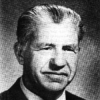M. H. Abrams

M. H. Abrams
Meyer Howard "Mike" Abrams, usually cited as M. H. Abrams, was an American literary critic, known for works on romanticism, in particular his book The Mirror and the Lamp. Under Abrams's editorship, The Norton Anthology of English Literature became the standard text for undergraduate survey courses across the U.S. and a major trendsetter in literary canon formation...
ProfessionCritic
Date of Birth23 July 1912
I was never a monist - always a diversitarian.
jews western
Jews had an outsider's eye on a lot of Western tradition.
believed history understand
We believed that to understand literature, you had to understand its place in history and culture.
classical free ideas pagan rather religious secular thinkers work
Secular thinkers have no more been able to work free of the centuries-old Judeo-Christian culture than Christian theologians were able to work free of their inheritance of classical and pagan thought. The process... has not been the deletion and replacement of religious ideas but rather the assimilation and reinterpretation of religious ideas.
criterion looking nature pass poem test
The first test any poem must pass is no longer, 'Is it true to nature?' but a criterion looking in a different direction: namely, 'Is it sincere? Is it genuine?'
appealed boys romantics whipping
The Romantics were whipping boys of the New Criticism, but they appealed to me anyway. I was recalcitrant. It was clear to me that they had thought innovatively.
interesting humanity humans
We are human, and nothing is more interesting to us than humanity.
graduation ideas students
When I was a graduate student, the leading spirits at Harvard were interested in the history of ideas.
book literature
Life without literature is a life reduced to penury.
mean poetry body
If you read quickly to get through a poem to what it means, you have missed the body of the poem.
teaching effort way
At first, students tend to freeze at the first effort. The breakthrough comes when they realize that they can make it better - can identify what their purposes were and realize better ways to achieve those purposes.
views predictions decades
If you learn one thing from having lived through decades of changing views, it is that all predictions are necessarily false.
book reading hard-work
Hard work makes easy reading or, at least, easier reading.
long humanity survival
The survival of artistic modes in which we recognize ourselves, identify ourselves and place ourselves will survive as long as humanity survives.